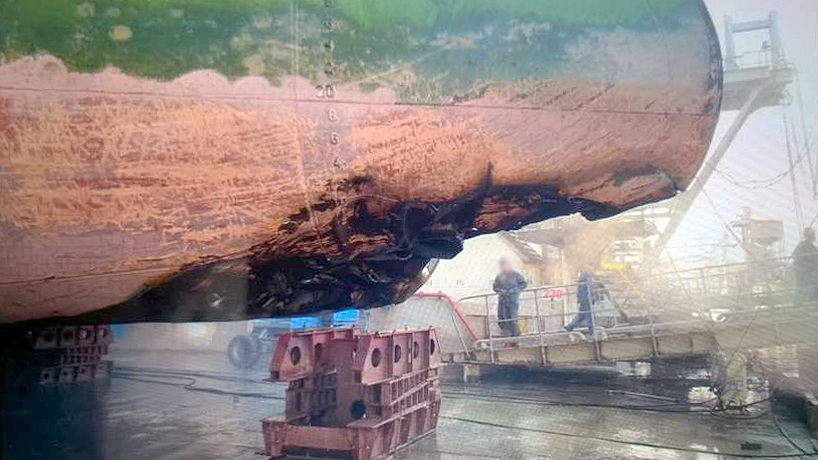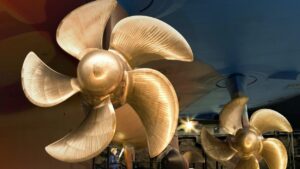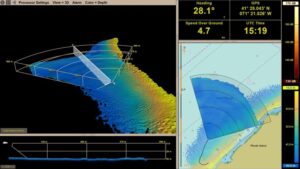Cargo ship grounded after ‘drunk’ watch officer fell asleep

The UK Marine Accident Investigation Branch (MAIB) has issued a shocking report into circumstances surrounding the 2021 grounding of a cargo vessel on the west coast of Scotland.
The report identifies key safety issues, including that the vessel had diverged from the planned track when the Officer of the Watch (OOW) fell asleep. The report finds the officer in question was asleep when the ship grounded, and he was alone on the bridge.
Safeguards to prevent this from happening, including bridge watch alarms and coastguard interventions, had been disabled or removed, and the officer had been drinking alcohol both immediately before and at the start of his watch.
The report highlights that records and documentation were ‘systematically falsified’ on board BBC Marmara to satisfy audit and inspection requirements and avoid sanction or delay. These records included hours of rest and watchkeeping schedules.
Grounding of BBC Marmara
At 0332 on 25 July 2021, the Portugal-flagged cargo vessel BBC Marmara ran aground on the island of Eilean Trodday while en route from Foynes, Republic of Ireland, to Scrabster, Scotland, with 1,407 metric tonnes of reinforced concrete beams on board.
The ship’s passage through the Little Minch and North Minch to its destination port of Scrabster, on the north coast of Scotland, was planned to conform with the mandatory and recommended International Maritime Organization (IMO) ships’ routeing.
On 24 July 2021, an able seaman (AB) learned of the death of a family member and invited three crew members back to his cabin for an informal wake. From about 2030, the AB, an ordinary seaman (OS), the second officer and a cadet admitted to drinking beer and Jägermeister — a German liqueur with 35 per cent alcohol by volume — in the AB’s cabin. At approximately 2330, they took over the watch from the master, arriving on the bridge shortly before midnight.
The master left the bridge after a brief handover and conversation with the second officer. At 0017, approximately 10 minutes later, the cadet and AB from the earlier gathering arrived on the bridge carrying three more cans of beer that the master had given to them. Lively conversation continued between the three crew members while music was played. By 0058, the second officer was on the bridge alone.
At 0210, BBC Marmara overshot a planned alteration of course. At 0214, the Electronic Chart Display and Information System (ECDIS) alarm sounded to indicate that the vessel had exceeded the maximum planned cross-track distance (XTD). The alarm sounded 15 times until a course correction was made, which placed the vessel on a convergent course with the IMO recommended route and planned track of 062° passing north of the island of Eilean Trodday.
At 0243, BBC Marmara passed reporting point Foxtrot, where the next VHF radio report was due into Stornoway MRCC; however, no call was made. At 0248, loud snoring could be heard on the voyage data recorder (VDR) that continued intermittently as the vessel crossed its planned track. At 0330, the ECDIS look ahead alarm sounded and, at 0332, BBC Marmara ran aground on Eilean Trodday at a speed of 11.2 knots.
After the crash, the ship was refloated successfully and then proceeded to the port of Stornoway, where a dive inspection confirmed significant damage to the forward part of the vessel’s hull, including penetration of the bow thruster space and forepeak tanks. A port state inspection granted permission for BBC Marmara to sail to Scrabster to offload cargo before proceeding to a dry dock in Poland for repairs.
BBC Marmara is owned and managed by Briese Schiffahrts GmbH & Co. KG. The report finds that the owners and managers did not have the necessary assurance tools in place to understand whether the control measures implemented for alcohol; the voyage plan in use differed from the approved voyage plan supplied by the authorised voyage planning service for the vessel; and the watchkeepers at Stornoway Maritime Rescue Coordination Centre did not intervene before the grounding as they were distracted by an ongoing search and rescue incident.
Following this accident, Briese Schiffahrts GmbH & Co. KG say they have taken action to improve the effectiveness of the company’s safety management system in controlling shipboard practices, especially concerning the consumption of alcohol and use of lookouts and watch alarms.
The Maritime and Coastguard Agency has conducted a review of the accident and taken several steps to improve the level of vessel traffic monitoring across the national network.
Recommendations have been made to Briese Schiffahrts GmbH & Co. KG to ensure that a lookout is on the bridge in times of darkness and to implement management assurance tools that will provide accurate feedback on the effectiveness of its safety management system and the Maritime and Coastguard Agency to increase organisational knowledge of cognitive performance and to plan accordingly.
The full report is now available online.
Main image: BBC Marmara damage pictures from the MAIB report.










